#we have like two sources of information and they're both unreliable
Text
If the Train gave all the passengers grey jumpsuits before Amelia got involved, and it usually doesn't let you take stuff from the Train home... at what point did it give your stuff back? Did One send a Steward to give your clothes back when you got your Exit? Kez seems to know about the Stewards, but she seemed surprised when it brought gifts. Did it never show up to return Jeremy's stuff? We see him wearing normal clothes in the photo, but that was given to him by Morgan.

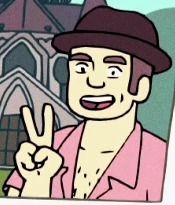
Where does the line fall between what you're allowed to keep and not? Jesse doesn't get to take the Apex harpoon pack with him. Lake gets to keep the clothes and the bank pen bracelet, but the handcuffs don't go through. They stay attached until Lake makes it all the way through, even after both arms are already on the other side. The cuffs only disappear after the door closes. The harpoon pack only falls dramatically after the last trace of the glowing doorway has faded away, even though Jesse was still wearing it when Lake last saw him. It almost lets you bring things up until the last second before snatching it back.
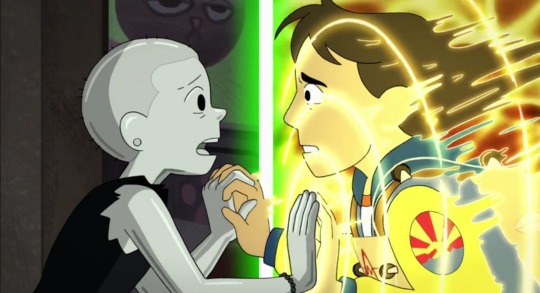
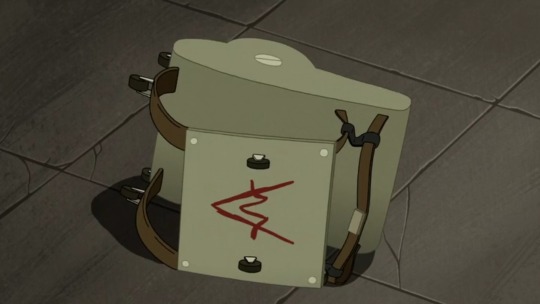
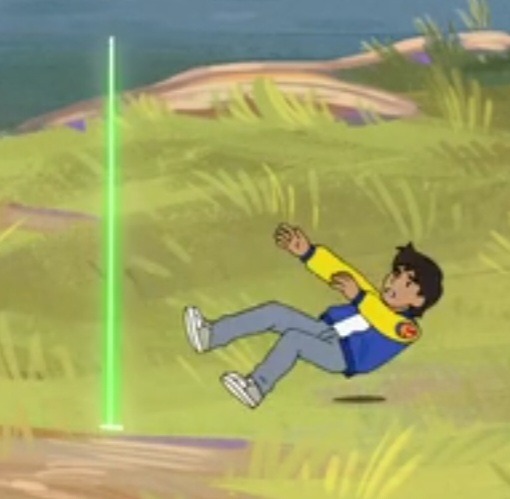
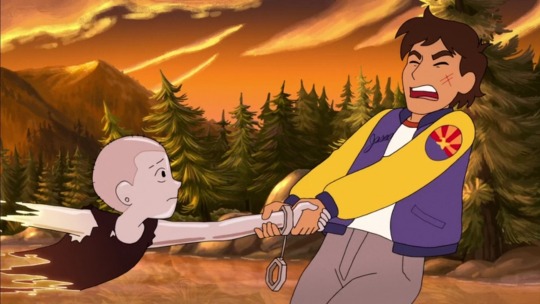
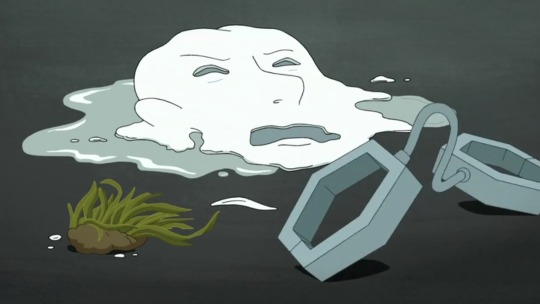
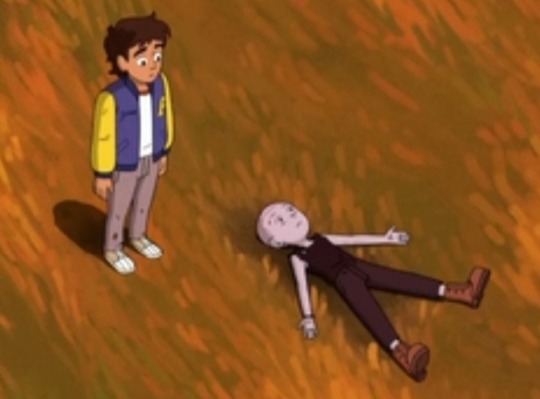
The determining factor seems to be if it could be used to prove the Train's existence. Maybe the handcuffs were left behind because they were from the Mirror World, which the Train seems to consider to be under its jurisdiction. It seems to let you keep the clothes on your back, but if the jumpsuits made it though then they could have been used as proof. In that case, would it just spit the passengers out with nothing? The exits seem to work like doorways, so it probably wasn't returning your stuff as you passed through.
Chances are, it lets you keep your outfit within reason. It may be a magical train that kidnaps people and forced them through therapy from hell, but it has STANDARDS! If it looks like something you could find on Earth, then there would be no reason not to let you take it. If its something completely inexplicable like a custom-made harpoon pack, then that has to stay. But some normal looking clothes you stole from an abandoned mall would probably be fair game. It also probably wouldn't let you say, throw a bunch of apples through the open Exit in an attempt to solve world hunger, as amazing as that could be. The Train doesn't care if you starve as a passenger, why would it care if you starve on Earth?
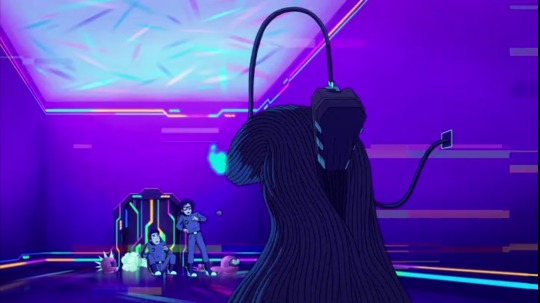
Random stuff in pockets or backpacks might be up for debate. Tulip probably still had the Donut Holer in her backpack, but someone who ran away for months coming back with a pipe for self-defense doesn't seem out of the ordinary. Nobody knows where she was, for all they know she could have needed it. It was confirmed in an AMA that if Jesse's phone had remained un-smashed, then his photos would have ended up blurry and worthless as evidence. It seems important that the Train keeps itself secret under most circumstances. There are reasons it wasn't willing to let Denizens get their own numbers. If everybody knows about the Train, then they won't want to get on.
But when the hell was One planning to give back their clothes? Did Jeremey not have any need for his stuff because Morgan and Kez took such good care of him? Or did One just say "Yoink! This is mine now!" every time someone brought something on board? At what point in the pre-Amelia process were personal belongings dealt with? How many people lost their keys in the process? How many passengers never got their stuff back?
#infinity train book 2#infinity train book 4#could you imagine if it dropped you off in the snow with a nice toasty jumpsuit only to rip it away at the last second?#I'm trying to write that essay#but the mirror world is confusing#I'll probably just break it up into smaller posts#we have like two sources of information and they're both unreliable#they literally contradict each other and I can't tell if its bias or a retcon#infinity train#cryptid's theories#cryptid says stuff
106 notes
·
View notes
Text
as a lifelong ATLA fan who narrowly had ATLA dethroned as my top show by The Dragon Prince steadily over the past 5 years, the similarities between the two have very little to do with the surface level parallels that get regularly drawn between them.
Like ATLA, TDP has Books for seasons and chapters for episodes, but unlike ATLA, which only touched on storytelling sparingly as a theme, TDP is obsessed with interrogating storytelling and history and the presence of unreliable, biased narrators throughout many of its episodes (most notably 2x05, 2x06, 3x06, 4x04, and 4x07 among them). Half of what you learn in the 1x01 intro ends up being a lie once you reach S3, with more being steadily deciphered.
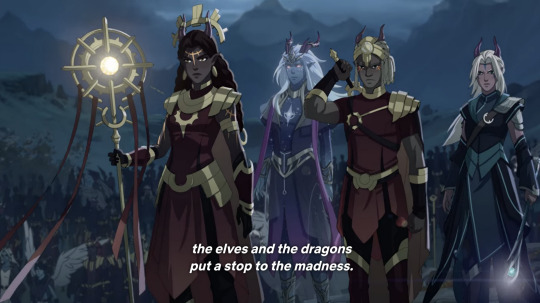
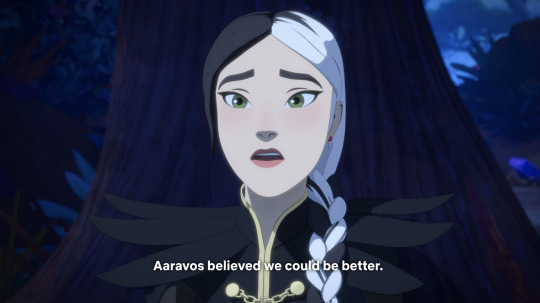
Yes, TDP has different magics with people living under those umbrella terms... for the elves. Humans are coming culturally at things from a completely different angle, and the elves' connection to their primal sources are discussed philosophically in detail, informing their practices and their culture first hand, including the way they chafe against humans, who are arcanum-less. Many animals in the world are also connected to magic, which influences both their design and which ones get hunted for humans' more 'clever' solution in dark magic, including each other.
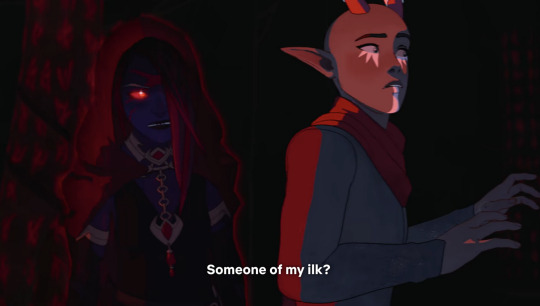
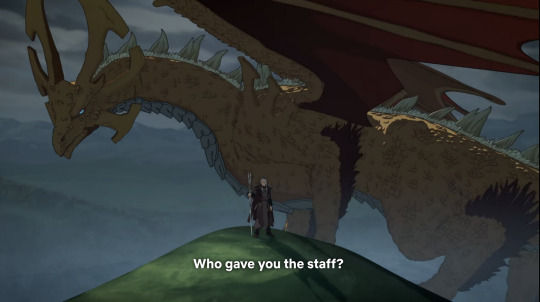
The core issue of the Puppetmaster, down to being a coercive magic formed by someone deeply resentful of their imprisonment? Said puppetmaster is the main endgame antagonist of the entire show with all of S4 onwards being exploring the ethics of controlling people against their will in various methods, and the entire show itself being a thematic battleground of fate (imprisonment) vs free will for virtually every single character.
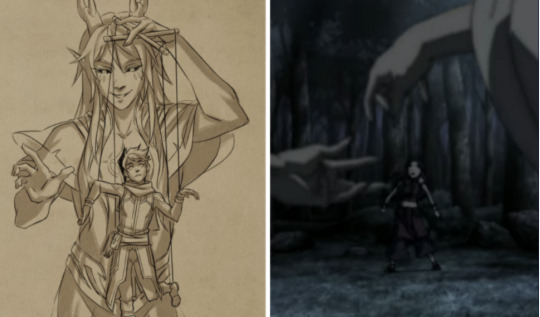
Where ATLA mostly concerns itself timeline wise with ending the war, very little thought is shown by any of the characters as to what they'll do after the war. This isn't a problem (as it reflects the sheer domineering scope of the conflict) but even Zuko being firelord is only ever really addressed with 2.5 episodes left till the finale. TDP, meanwhile, ends its 'war' in s3 and s4 opens up with dealing with the old wounds festering between people with centuries of history, the struggles that come when people aren't able to let go and believe they're safe or mourn in a healthy manner, and the religious/cultural clashes that may occur when trying to integrate different groups of people.
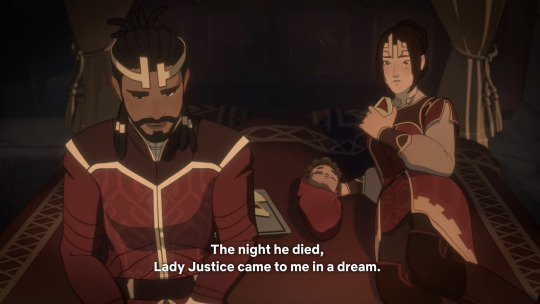
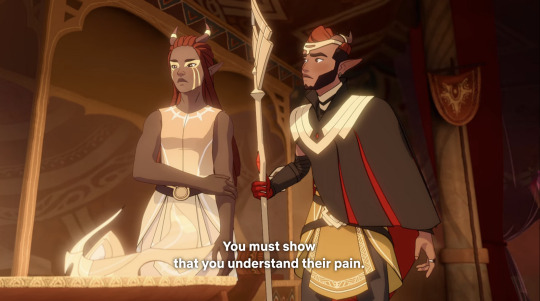
TDP also has an evil father with a devoted daughter and a brother who eventually defects, but it explores the reality of an abusive parent who loves/will sacrifice for you and your right to leave regardless, even if that means leaving the sibling you truly deeply love and who loves you in turn. Which means that when you and your sibling are on opposite sides of a deep ideological conflict, it actually really fucking hurts bc we've seen first hand just how much they love each other and also how and why everything fell apart not in spite of that love necessarily, but also because of it.
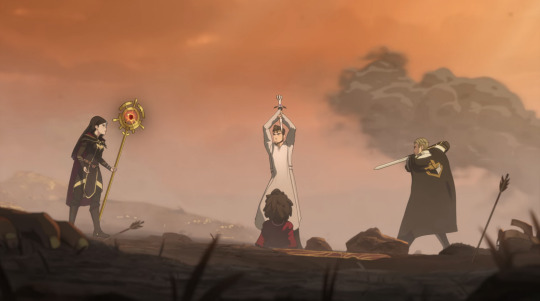
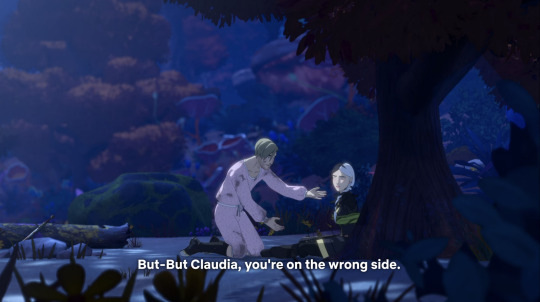
Is this to say that TDP is a 1:1 with ATLA or that it's better? No, not at all, and the latter is subjective. I prefer TDP, but I think they're about on equal ground when you look at each show currently as a whole (although TDP has two seasons left to go).
But TDP takes a lot of what ATLA was doing thematically with some of its most interesting beats and then builds or expands upon them further. It talks further and more consistently about the cycles of violence; in many ways, Jack De Sena's character, Callum, begins the series largely where Sokka had ended (and he's not the most like Sokka anyway; very much his own thing); we get Faustian bargains and centuries' long grief and fucked up people who are trying both succeeding and failing at not doing fucked up things. There are antagonists, but it is very hard to actually label anyone at this point a straight up villain. Moral greyness is where the show starts, and it just continues from there.


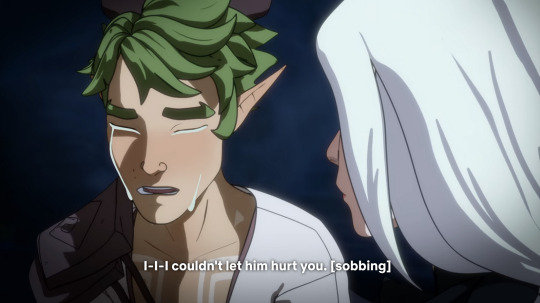
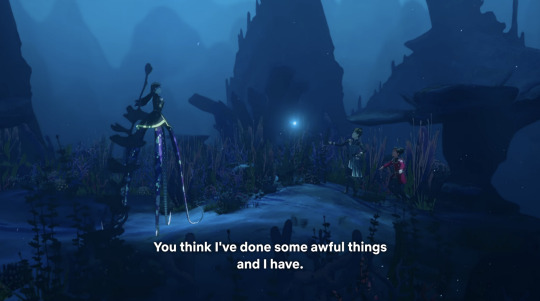
That's not to say the show is nothing but dark and depressing - like ATLA, there's a steady thread of hope and humour even as the show gets steadily closer and closer to its 11th hour point - but the show is usually emotionally heavier. There's more blood and potentially disturbing imagery with body horror and on screen death. There's so much foreshadowing you basically can't go more than 5 minutes into any episode without having something that's going to come back around or be referenced again like 3-5 seasons later.
Just to be clear - TDP is like ATLA, but it's like ATLA in interesting ways beyond the more shallow surface level that usually gets attributed to it, while still very much being its own show and its own thing. And that is why I tend to recommend it to people who like ATLA.
Thank you and goodnight
(Also, the fandom doesn't have any ship wars, and the show is queer as fuck)
#tdp#atla#the dragon prince#avatar: the last airbender#mine#parallels#analysis series#also betrayal. tdp talks a lot more about betrayal#now im trying to think if there's any character in tdp who hasn't felt or been outright betrayed#i. DON'T THINK SO??#atla meta#tdp meta
391 notes
·
View notes
Text
The Emperor wasn't 12 feet tall
I see this meme a lot in my Instagram feed and it really grinds my gears:
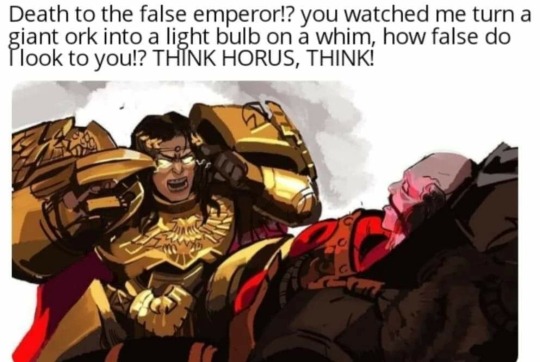
Not because it seems to be trying to shame a fictional antagonist for being "wrong" (although that really doesn't help), but because whoever made it seems to have missed that depictions of the Emperor as superhuman are meant to be Imperial Propaganda.
Now, I realise I'm going to be fighting an uphill battle here because there seem to be people working for Games Workshop and producing their media who also missed that memo, and for a while now the studio has started producing actual depictions of the Emperor, and some of those depections show him as 12 feet tall and immortal. This might be controversial but I think what this shows is that Games Workshop don't understand Games Workshop's source material.
Here's a picture of the Emperor from the original Rogue Trader rulebook.
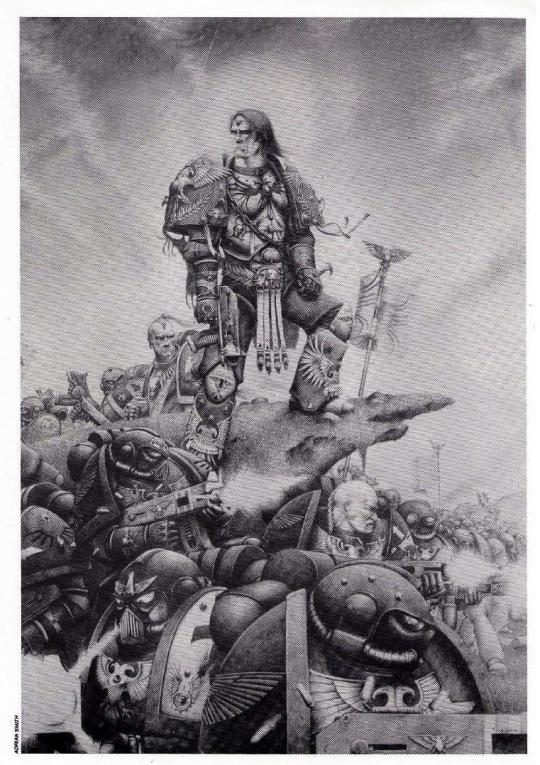
Even this is obviously meant to be a propaganda image, but here he looks like just a regular guy in armour, he's about the same size as the people around him. Not a superhuman, just a guy with an excess of hubris.
There's this literary construct called the unreliable narrator. When I studied literature we were given this short story to read called Bartleby the Scrivener. It's told from the point of view of an employer about a clerk who was apparently really difficult to manage. The subtext is that the narrator is trying to manipulate the reader to make themself look good.
For a long time, that's what Warhammer 40,000 did, the Imperium was made out to be an unreliable narrator. Stories about the Imperium's "glorious past" were told through the haze of ten thousand years of unending war, by an ecclesiastical class with a vested interest in keeping Imperial citizens committed to feeding the war machine. To the Imperium, the Great Crusade and the Horus Heresy serve the function of myths, more than history. I've gone on before about how important heroic figures like Siegfried and Perseus and Prometheus were to the Nazis. The Imperium, being a fictional state that draws on the aesthetics and ideology of Fascism, uses the figures of the Emperor and Primarchs the same way.
Basically what I'm saying is that when Imperial sources state that these people were twelve feet tall and immortal and could, um, turn a giant ork into a lightbulb on a whim, it's not because they had these powers, but because they've been ascribed these powers by their priesthood, who have total control over the flow of information in this setting.
And I get that this is hard, because most people don't get taught this stuff, and often people are probably looking for escapism from their fiction and why would the book I'm reading lie to me? But I think it really makes the setting more interesting if you look at it this way.
Also, I realise that since 2006 there have been books around that describe the Emperor, and they do show him as superhuman, and I think those depictions are based on the writers misunderstanding the material they're working from. I guess Tolkien wrote the existence of The Hobbit into Middle Earth as the Red Book of Westmarch so I can tell myself that the Horus Heresy novels are meant to be in-universe Imperial propaganda.
ADDENDUM: I need to add this because I've been reading about Perpetuals, which is apparently what the Emperor is since the Horus Heresy series was published. Apparently these individuals are human mutants that are both immortal and invincible. I remember Mechanicum heavily implying that the Emperor and St. George are the same person. Here's the problem with that. There are two themes that I think are really important in Warhammer 40,000. One is the Emperor's hubris, the idea was that he was playing god, genetically engineering monstrosities in the form of the primarchs. In the Greek tragic mould, it's this hubris that leads to his downfall. This kind of loses its sting if he's just trying to recreate what what he already is.
The other theme is the Imperium's superstition. This one is really the core of 40K. The Imperium has taken the corpse of a man who tried to rule the galaxy, told themselves he's not dead, plugged the corpse into a machine that "regenerates" him, and founded an intolerant, violent and expansionist religion around this husk. This theme changes significantly if the Emperor actually was as powerful as the Ecclesiarchy makes him out to be, and actually isn't dead, and has somehow been regenerating for the last 10,000 years. There's a question here about what would make an entity worthy of worship, or being called a god, and I probably shouldn't get into it but this is my blog so I'm going to. It seems like there's an assumption among some writers that if something can be rationally explained then it's not a god, because gods ipso facto don't exist. They've incorporated nonexistence into their definition of gods. This is where you get the idea that the Chaos gods aren't gods, because the setting explains their existince "rationally" with its internal logic (nevermind that there's nothing rational about the warp). If there were gods in a rational sense, then our model of the universe would have to change to accomodate them. I think the upshot of this is basically that if what the Horus Heresy novels claim about the Emperor is true, then the Ecclesiarchy are right and he is a god within the logic of the setting. That doesn't justify the genocide and expansionism, but maybe it does justify the worship, and that's something that I think takes away from the setting.
68 notes
·
View notes
Note
Do you think Will could have blocked some memories of what happened during his time in the UD, like El did with what really happened in the lab? And how likely do you think it is that the duffers could bring that to the story?
confident yes + highly likely to both. this is going to be a long response, because the evidence in its favor is abundant.
the details of what happened to will in the upside down were never plot relevant before and we know that canonically everyone treated will like he was gonna break, like he was a baby, and like he couldn't handle things on his own (his exact words). given that, i doubt they were asking him about what happened even if they were curious. they only learned about what it was like to be possessed because that information was necessary in both season two and three.
now, in season four, we and the characters learn many things:
henry was a child when he first became a predator, started "reaching into others, into their minds, into their memories", "became an explorer", conceived his plan to "restore balance to a broken world", and grew the hive mind.
when henry first lands in the upside down, it does not resemble upside down hawkins at all. it's its own golden world with seemingly peaceful life forms.
henry is the one that shaped the particles, that has used its power, and that has been behind everything we've seen so far. ("it was you. always you." + the demodogs only attacking when invaded by dark particles.)
the teens learned that the upside down is stuck in time on the day that will went missing.
there are light particles which "feel good" and allow you to communicate with the other side.
will confirms that he is still psychically connected to henry directly.
season four focuses on truths, lies, and their consequences. we see that the only way to move forward, become stronger, or be saved is by uncovering and accepting your truth. not only that, but we get a hefty amount of unreliable narrating. there are some things that this season tells you and others that you have to work to discover yourself, just as the characters have. there are also some very fascinating lines about this and examples:
"I’m sorry, Eleven. You’ll have to find your own way out. Leave your train station. Stop waiting. Focus. Listen. Remember."
not to make everything about will byers, but considering the fact that the duffers didn't shoot down the idea that everything is related to will byers...
consider this: henry keeps coming back year after year, because they're all relying on eleven to fix it, but she can't. she isn't the cure, no matter how many people keep trying to force this on her. in fact, will's the one that we're shown standing in front of a "the cure" poster. this is further implied by dustin rolling an eleven against vecna and losing. the day is saved by a pair of siblings & will tells her in that same episode "it's gonna be okay, it's not that bad. we'll fix it together, okay?"
will needs to find his own way out of this neverending story. he needs to think back to what happened in that shed and directly after. he needs to remember the lights, the phone, and the stereo. he needs to recall how he managed to survive staying in that house when the demogorgon knew he was there and would appear seconds after right where he was, and why it never went after him but went after joyce instead. he needs to recall who took him and what he saw at the library. there's so much that only will knows. he just needs to remember.
"There are good people, brave friends, who have helped you fight your battle in the past. But they alone can’t win this war, not without you. I know it’s not fair to ask more of you, but I wouldn’t be here if I didn’t think this was the only way, if I didn’t think you were the only one who might have a shot to hit this thing so hard it can’t get back up."
dr. owens is known to be an unreliable source (in my eyes). he didn't trust will at first in season two, he wasn't there for season three, and then he gets it 100% wrong in season four.
eleven hit henry and he got right back up.
they didn't win the war, even with her help.
the group has helped eleven in the past, yes, but, barring season three, everyone has banded together to help save will's life twice.
eleven "started this war" by creating henry, but she's always been removed from it. will was the one fighting to survive in season one & will was the one that got possessed in season two. she helps, but the war was only centered on her in season three because henry switched objectives and sought her power instead.
like... he's literally talking about will lol. he doesn't mean to lie, but this is a lie that has consequences. hawkins falls, max goes missing, and henry has won. will is the only one that can tell them how this story begins, who is still connected to him, and who needs to join the fight for once. will is the only one that knew how to defeat henry in season two and he's the only one that'll be able to tell them how to defeat him in season five.
(also, it's interesting how eleven's decision to "conform" by "doing what she's told" (as owens says) ends up "killing the kids" aka max. not her fault, though—max's fate was inevitable.)
"But there are others who don’t believe in you, who think you are the cause. I believe they’re wrong. I believe you’re the cure." [Cuts to Jonathan saying, "The reservation’s under 'Byers.'" as the camera then moves over him, Mike, and lands on Will who then looks up.]
will is someone everyone feels they have to protect; he's the damsel, never the hero. he's also the beginning of this story—he's the first and last bearer of his curse, the one he came back for and has not let go of still. he's the one related to "the cure". the scene literally cuts to him before going back to owens and eleven, so i'm filing that as "proof" that owens is incorrect. she isn't "their only hope".
Owens: “We should’ve just told her the truth.”
Brenner: “And risk everything? She’ll find out soon enough.”
this one's funny. it explains why we and the characters don't know why henry and will are still linked, and what happened in the upside down. it would compromise everything.
"The truth is, you're regressing, Eleven. You're going backwards. [..] I know you're frightened. You're terribly frightened by what you've seen. But it's this very fear that's now holding you back. If you want Nina to succeed, you cannot hide from the truth, no matter how frightening it may be."
this one applies to many characters. will seems to have made progress in lenora, but he regresses by lying to mike and hiding from his truth. he veils his confession, pushes mike in eleven's direction, and dooms them all for it. addressing his trauma and being honest about his feelings isn't going to be easy, but he needs to do that to help them win this war.
i feel like there are more lines from this season, but this post is already long enough lol.
in addition to canon s4 evidence, it already is established that will doesn't want to revisit those experiences and whatever memories he has of them unless absolutely necessary.
in season three, when recounting having sensed the mind flayer's return at various times, will says: "I didn't think it was anything at first. I mean, I think I just didn't want to believe it."
also, did everyone forget how henry already blocked will's memories once? that was a key point of his possession, the reason for the shed scene, and joyce's biggest worry ("What happens when he can't remember anything? When there's nothing else there? What happens when my boy is gone?")
that, along with everything presented in season four, tells me that will is the missing piece. all of them fought alongside eleven and it wasn't enough. dustin said they needed will and he was right. henry is said multiple times to be a mind explorer that toys with people's memories. the duffers have ALREADY done this twice now. "every ending has a beginning." the teens figured things out, but not all of it and it contradicts what will experienced in the upside down. will is henry's perfect character foil. he's the last curse left. the show begins with the vanishing of will byers, but we don't actually know what happened to him. it literally all points in this direction.
season four was all about lies, whether intentional or not, and season five will be based on the truth finally coming out.
#byler#<- inflicting this on u all teehee#this is my favorite theory ever it's the one thing tht i believe in more than i believe in byIer endgame lmao#i could talk abt this + his connection with henry literally All Day Every Day bro i am not a fan i am a Scholar#will#will theories#s5 predictions#long post
76 notes
·
View notes
Text
Lottie never actually talks to the team about her diagnosis. Her official diagnosis is not known to anyone prior to the crash because of her father's insistence. Rumors float around the gossip mill, in the halls of the high school as well as within the Matthews' social circle. Everyone knows that there's something off about Lottie, but it's not known that she's schizophrenic. She never brings it up in the wilderness either because she doesn't really see the point, even though again, everyone can kinda tell there's something weird about her.
The truth comes out to the general public while they're gone, or maybe shortly after the rescue. Maybe some overzealous reporter trying to get some kind of scoop finds out and publishes the information as some sort of sensationalist piece. It's the exact kind of front page story that tabloid magazines would love. We also know that post-rescue, Lottie is catatonic for months at least and shipped off to Switzerland before having the opportunity to talk with anyone, particularly people from the team, so they spend all this time only ever getting information from whatever sources reporters have (which likely aren't the Matthews lbr).
So basically for over two decades, Lottie's schizophrenia is used as a scapegoat, both by the public and privately by the survivors. Once people hear about her diagnosis, it colors everyone's perspective in a way that prevents her actions from ever being separated from her illness. They attribute all of that trauma to her illness, somehow both infantilizing and villainizing her in the same breath. Even though the larger world will never know the extent of Lottie's role in the wilderness as the (first) antler queen or how she "started it", there's always going to be stories about the crazy girl that got institutionalized after getting rescued from a traumatic experience, and people will draw their own assumptions about what that means.
But it's important that Lottie has never really had the opportunity to talk about her mental illness with the others, and their perspective of it is built entirely off their own internal biases and what other people have said about it, not what Lottie herself has described. By the time the team reunites 25 years later, she sees no reason to really re-hash the past when it's clear that they still blame her. She also blames herself because she has also come to believe that narrative spun by others, so she's fine with shouldering that blame, particularly if it means helping them process, just as she always has. She's an unreliable narrator (as most of them are) but in a large part because she's never been able to trust her own mind, so she trusts doctors and her parents and what they say because why shouldn't she? And if that ain't a perfect allegory for how the way mental illness is portrayed despite the fact that people with mental illnesses are way more likely to be abused/assaulted than to be the perpetrator.
#[ ch: lottie matthews. ]#[ hc. lottie matthews. ]#once more a collection of random thoughts#but i do think it's important that the official diagnosis isn't even a fact until later on#and that the survivors buy into lottie's woo woo without that#there's an element of shock and betrayal and realization once they find out#that i think is delicious and a good portrayal of how mischaracterized mental illnesses are by the media#especially ones like schizophrenia
1 note
·
View note
Note
(in relation to my previous post)
Blitzo and Stolas breaking up would be almost too good for this show, actually. If done right, it could be a REAL comment on a toxic relationship. That people who don't respect you aren't worth of sticking around? That you in any circumstances deserve better than a partner who belittles you and treat you like an object? That you should think what are you doing wrong if your partner tries to avoid you constantly and doesn't want to be around you? That you shouldn't do things that makes your partner uncomfortable? I can go on, but I think you get a picture.
Fans like to talk how "deep" this show is and how it's all about relationships, but so far it implicitly gives you a really bad advice on it, by showing how the characters are constantly tolerating and ignoring shitty behavior from others. I know, "they're in hell" but it's really bad when your characters get almost no consequences for said shitty behavior. And this show doesn't strike me as cynical either, Viv clearly wants us to believe that this characters would get better as people, she just does a really bad job for conveying it. At the end of the day, I think Viv just wanted to have some spicy relationships in her show but didn't know how to do it properly, so we ended up with this. And, well, it sells, apparently.
...
Welp, that was a lot. Sorry that you had to read my rant, lol. I really like your blog and I just wanted to share some of my thoughts, I hope that's okay :-)
"Fans like to talk how "deep" this show is and how it's all about relationships" Yeah, relationships that are either abusive, smothering, or unrealistically happy. And does anyone else find it weird how Viv's mlm characters are overly sexualized in their words and actions when no other main character is*? Angel Dust makes sexual comments to every dude he sees, Blitzo's a bit too eager to trade sexual favors for what he wants, and Stolas spends a good chunk of time sexually harassing Blitzo (until Ep 7 when Viv suddenly decided he was in love with him). Seems a tad... fetish-y.
Now there's nothing wrong with excitement over the prospect of two dudes boinkin'. You're into what you're into. But it becomes a problem when you prioritize the sexual aspects of characters in mlm relationships over their personal development. Do you want to tell a deep, nuanced story, or do you just want to make hentai? Either is fine, as long as you're honest about it, and you don't end up fetishizing the group you're writing about.
*I vaguely recall reading that Husk and Moxxie were pan and bi, respectively, and they aren't over-sexualized like the three characters I mentioned. However, until we see some evidence of these orientations in Hazbin and Helluva, I don't consider them canon. Information regarding both shows has been so spotty and unreliable (Viv herself can't decide if Loona's 20, 22, or 23 years old) I don't know what to believe at this point. Better to wait and see what's established in the source material than get conflicting "confirmations" from five different livestreams and two different Patreon Q&As.
And no, that evidence doesn't have to be a giant neon sign that says "I'M INTO DUDES", Viv. Treat your audience like the intelligent adults you want to attract. A little subtlety can go a long way.
29 notes
·
View notes
Note
Hey there I just followed after going through your blog. I saw a post criticism O'Brien and Daimler. I've read both and have my own opinions, but do you think they're a reliable source? Should I look elsewhere for information?
Sometimes..... popular authors...... are worse. jk jk that's not the answer I'm giving you, this got kinda long though, apologies in advance.
So I'm not super fond of O'Brien and Daimler, but to be fair, a good 30-40% of my issues with them come from the fact that they have what's essentially a cult following in pagan spaces where people take their word as absolute fact and any interpretation that disagrees with them is seen as something almost heretical. Which is frankly absurd, and dangerous. We should be fostering discussion, not saying that if you disagree with someone's interpretation that you're stupid. I don't dislike anyone on the merit that they happen to like Daimler or O'Brien, or that they share their interpretations, but I do take issue when someone says that they believe something just because Daimler or O'Brien said it. And that happens a lot more than you'd think.
I haven't read enough of theirs to say definitely that they're reliable or unreliable- I don't really read from pagan authors very often, primarily because most of them wouldn't know what historiography was if it bit them in the ass and think that fact checking is beneath them and I'm grumpy and don't want to deal with that nonsense. Most of my interpretation comes from reading the works of academic Celticists, reading theological texts and academic studies of early Chrisitian theology, and actually reading the lore. I will say that some of the interpretations made by O'Brien and Daimler just don't make sense if you've ever actually read the lore, and I think that some of their writing is definitely geared towards people that they know will never read the lore or who want the lore to fit their own sensibilities (*cough* neopagans *cough*).
I'd say the same thing about I'm about to say for any author, pagan or academic- it is your responsibility as a reader to verify the claims being made by the author, to check their sources and see if what they're saying actually lines up with the text(s) they're referencing. It's your responsibility to read multiple sources, and from those sources it is your responsibility to glean your own understanding, and not the understanding of just one author. If you agree with a particular author you should understand why you agree with them, and that reasoning should come from reading other sources.
Ultimately I guess my point is that I'm not here to tell you what to think, and that I offer my interpretations and opinions only to help foster critical thought and discussion. I don't like the echo chamber that the gaelpol tag feels like sometimes and while I'm not playing devil's advocate by any means because I actually believe what I say, I do think that showing different viewpoints can bring about discussion, like the kind we're having now and that it can in turn bring about community growth because if we're all just sitting around posting the same regurgitated material from two authors without thinking critically about why we're posting it other than "well everyone else posted it so it must be good" then we're not actually doing much of anything.
#musings#answers#hello new friend!#community#community building#research musings#tagging that only because I talk about some of my methods here
6 notes
·
View notes